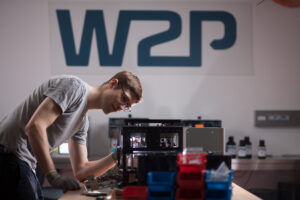Bulgarian ScyNet Wins Three Awards For Its White Paper At Intel ISEF

The Intel International Science and Engineering Fair (Intel ISEF) is the world’s largest international pre-college science competition. It gathers on one stage some of the brightest young scientific minds. A jury of doctoral level scientists review and judge the work of the young talents. Around 1,800 high school student, 80 countries and a total prize of $5M, are the metrics that sums up the annual event.
This year’s edition of the competition was quite a success for the Bulgarian student Zvezdin Besarabov, who won a whole bunch of special awards for his white paper on “Distributed Machine Learning for blockchain analysis.” The young programmer is currently leading the development team of ScyNet, a Blockchain-enabled open infrastructure for self-improving AI agents. Besarabov, who has recently turned 18, played a major role in designing the blockchain protocol that powers ScyNet as an autonomous and self-evolving source of machine learning (ML) models.
In order to present his idea in Phoenix, Arizona, Besarabov had to win a local science fair first. In fact, the theoretical model, which brought him three awards, was initially described as a concept in a white paper created in February and is going to be submitted for peer review soon.
Recognition came from three different parts of the globe
Intel ISEF awards the best participants with two different kinds of awards. The grand awards are juried by volunteers, the special awards are provided from professional organizations and companies, who affiliate with ISEF as sponsors. This year around 50 organizations had sent their delegates to look for the most promising projects. Besarabov was competing under category Systems Software, Cybersecurity.
The first Special Award came from the US-based GoDaddy. The Arizonian company is the world’s largest domain name registrar and Web hosting provider. Being part of a tech company, the team of specialist was impressed by the applicability of ScyNet and the theoretical model behind its tournaments, which serve to validate the AI performance within the ScyNet network.
The other two special awards came from Saudi Arabia national education foundation MAWHIBA and the Russian University that focuses on IT and Robotics – Innopolis.
Training virtual decision makers
According to Besarabov, what makes SkyNet unique is its Zero-Knowledge Protocol, which allows a decentralized network of nodes to verify the accuracy of ScyNet’s AI solutions. This way it forms a fair competitive environment and can also be applied not only to ML, but any type of algorithmic scenarios.
ScyNet combines two of the currently trendiest technologies – blockchain and ML, to allow the development of powerful AI tools outside megacorporations such as Google, Amazon, and Facebook. Such a project requires enormous processing power, which could be provided by miner nodes that are currently mining Ethereum, for example. Therefore, the team of ScyNet develops a decentralized network of computers, in which everyone could participate through computing power and contribute for the creation and training of autonomous AI agents. Deep Learning models and the computing power of all the computers in the network are the two magic ingredients what make that possible. As the whole system is based on smart-contracts, anyone participating in the process gets rewarded once the market has validated an agent.
ScyNet is one of the projects of Comrade, a digital cooperative of 21 developers working on several projects. The Comrade has so far attracted €570K funding (€250K for the development of ScyNet from Telelink) to further develop its initiatives.
Read also:
+++Blockchain in Bulgaria: Everyone’s Talking but Who’s Really Doing it?+++





























